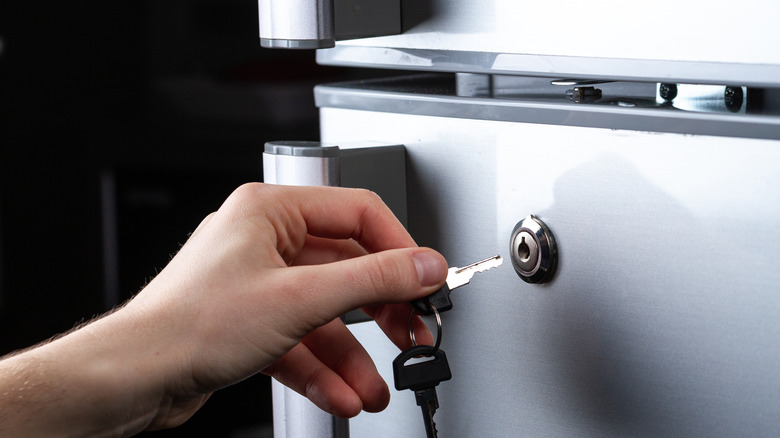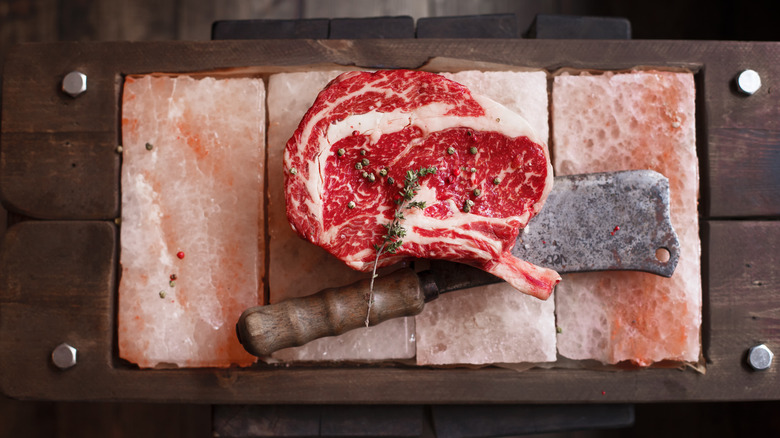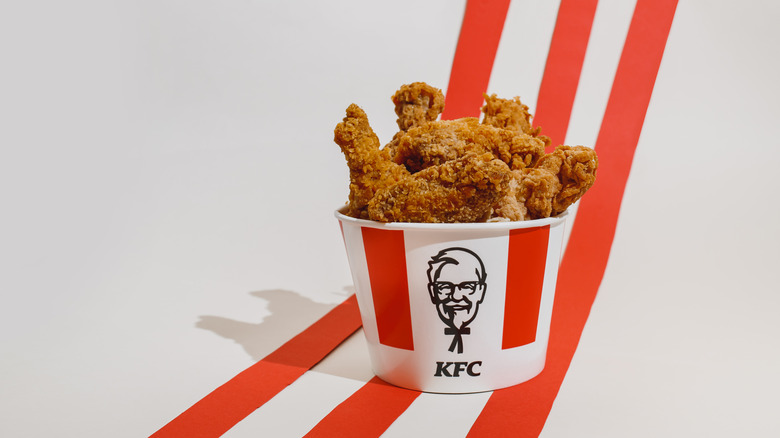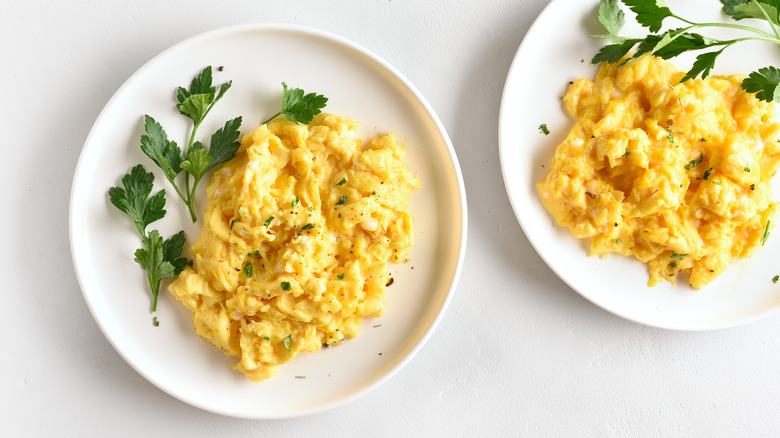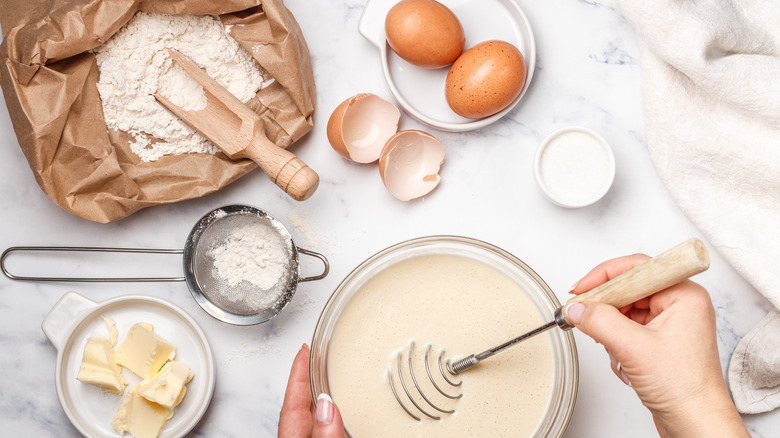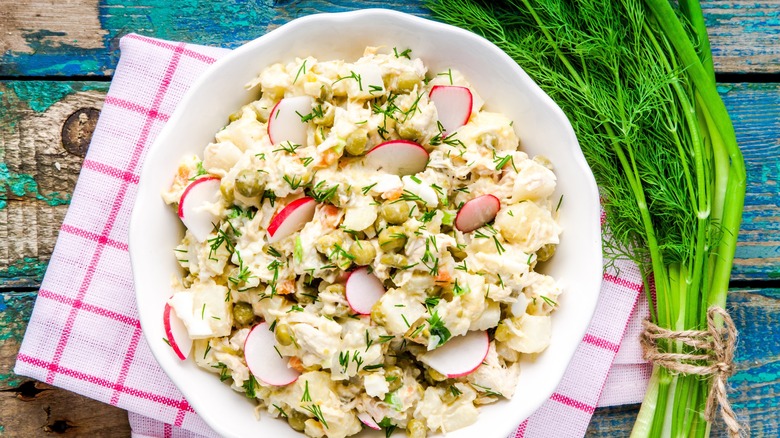How Restaurants Really Protect Their Secret Recipes
We've all had that one dish from our favorite restaurant that is just so good, we feel like we could eat it every day. You may have even tried making it at home once or twice, but somehow it's just not the same. What gives?
As you can imagine, those kinds of dishes are what restaurants stake their reputations on. It would be detrimental to their business if you were able to find that dish somewhere else and replicate it perfectly in your home kitchen. But, we now live in a world saturated with foodies who can reverse-engineer dishes, a steady stream of cooks going in and out of restaurants, and camera phones that can record and post information instantaneously. So how is it possible for restaurants to protect their secret recipes?
They've got a few tricks up their sleeves, as it turns out. You have no doubt heard about people leaving ingredients out of recipes, changing a few measurements before passing a recipe along, or even refusing to give a recipe at all. Is that how restaurants really operate? According to The Daily Meal, some of the biggest names in the food world, including Coca-Cola, Kentucky Fried Chicken, and Krispy Kreme have all managed to keep their signature recipes a secret for decades, even with the enormous number of employees at each of those companies. By carefully protecting that valuable information, this is how restaurants and food companies actually keep their prized recipes a secret.
Making a recipe a trade secret
A recipe, at least as it's defined as a list of ingredients, cannot be legally copyrighted. No one has the right to "one cup of sugar", for instance, because many recipes out there use that measurement. But a recipe does have a few routes for legal protection. One method, often used by some of the powerhouses in the food industry, is to classify a recipe as a "trade secret", according to Tucker Law. While each state has different legislation to protect trade secrets, almost every state does, in fact, protect them in some form (via Beck Reed Riden). They are also protected on a federal level by the Economic Espionage Act of 1996.
Some big steps need to be taken on the part of the restaurant for a recipe to genuinely be considered a secret. First, says Tucker Law, the recipe must actually be kept as secret as possible from all but the most essential people. Second, the people who do have access to the recipe need to know it's a secret that they are obligated to keep. Finally, the owners need to know the dollar value of that recipe. That figure includes how much profit that dish brings in, how much it's expected to make in the future, and the future rights to that recipe.
Chefs are asked to sign confidentiality agreements
While you might not think of a kitchen as a place that is subject to many corporate rules, you'd be wrong when it comes to some of the biggest restaurants out there. Even stand-alone restaurants not backed by a corporate group may require chefs and sometimes even cooks to sign a non-disclosure or confidentiality agreement. Otherwise, an employee manual may outline the non-disclosure practices that employees are expected to follow. Breaking a confidentiality agreement can lead to a chef's termination of employment or even a civil lawsuit if an employer can prove that they took a financial hit due to secret recipes and information being given away (via Chron).
According to The Food Law Firm, a standard restaurant non-disclosure agreement could include a wide variety of prohibited information, including information about recipes, trade secrets, and much more. Furthermore, the agreement typically extends beyond the period that a chef is employed at a restaurant. The terms of a contract can last from one to five years after the employee has left the restaurant. This would prevent a chef from moving to a new restaurant and recreating identical menu items from the last restaurant — even if they invented the dish in the first place.
Chefs may also sign non-compete agreements
In addition to confidentiality agreements, chefs may also be asked to sign a non-compete or non-solicitation agreement. This is meant to prevent chefs from being hired away by a competitor, specifically for their knowledge of a particular style of food. These agreements typically include a geographical distance from the restaurant that the chef is not permitted to work, sometimes covering an entire city. Like the confidentiality agreement, the second part of a non-compete agreement states how long a chef is forbidden from working in an area.
Many chefs willingly sign these agreements, but sometimes they can be damaging for everyone involved. In 2017, Eater reported that chef Adam Leonti had left a restaurant where he had signed a lucrative contract. The contract included a fairly strict non-compete agreement that forbade him from cooking anywhere in New York City for an entire year after he left, seriously impacting Leonti's career.
While chefs may not like such an agreement, it does make sense from a business standpoint in an often cutthroat industry. "When the only reason people are coming to your restaurant is the chef, losing the chef becomes irreparable harm," says Roy Salins, a partner at the law firm Davis Wright Tremaine. "If he or she opens across the street or in the area, that could greatly affect the business. That sort of harm means a judge will likely enforce the non-compete,"
Patenting a new or rare technique
In addition to establishing trade secrets and getting chefs to sign legal agreements, a chef or restaurant also has the option to patent a cooking technique if they can prove that it is truly unique. Now, this option isn't for just any old recipe. The recipe must be technically and scientifically new. One example of this kind of culinary patent is the meat dry-aging process invented by Chef David Burke in 2009. The patent for this technique includes a detailed scientific explanation of how steaks are dry-aged. The method involves the use of a special room designed with salt bricks, all to produce a meat product that had never been available on the market before.
There are a few catches with filing a patent, though, according to Modern Restaurant Management. First, a patent only lasts for a specific amount of time. Chef David Burke's meat dry-aging patent, for instance, is set to expire in 2030. After that, the technique will likely be available to anyone who wants to use it for profit.
The second and possibly biggest issue with filing a patent is that a chef or restaurant must publicly publish all of the details of the recipe or technique for the world to see. If you're planning on being in business for more than 20 years like Coca-Cola or Krispy Kreme, it may be in your best interest to keep your recipe a trade secret and forego the publicly available patent.
Limiting access to secret recipes
Keeping a recipe a secret doesn't always have to involve a ton of legal paperwork. Sometimes it's as simple as only teaching the secret recipes to the people who really need to know them, Webstaurant Store says. In most cases, that is a pretty select group consisting of the head chef and few other chefs. No need for a dishwasher or server to know the details.
Ultimately, the fewer people that know the details of a recipe, the easier it will be to keep it a secret. In 2018, the Los Angeles Times reported that the head chef of KFC, Bob Das, didn't even know the formula for the 11 herbs and spices that make up the much-vaunted and very secret KFC recipe. Now, that's a well-kept secret!
While some extra-observant chefs may be able to memorize the recipe, it's more likely that it will still need to be written down somewhere for reference. In that case, a physical copy of the recipe can simply be stored in a secure or locked location. Recipes can be digitally secured in the same ways you'd protect any other private information — with passwords, multi-layer authentication, and encryption.
Using ingredients that no one else can get
One way a restaurant or food producer keeps their most prized recipes a secret is by sourcing the ingredients from places that only they have access to. For example, the Coca-Cola company is the only legal importer of the coca plant in the United States. Per ABC News, it's even more locked down than that: "[T]here's only one factory in the country that processes the leaves exclusively for the company." So even if another company got their hands on the secret Coca-Cola recipe, it would still be impossible for them to make it the same way, lest they want to tangle with the Drug Enforcement Administration.
On a smaller scale, things get trickier. Restaurants very often order goods from the same food purveyors as other restaurants all over town. But to really make a specific dish special, many chefs will opt to buy some particular ingredients from smaller producers and farmers (via Fig Restaurant). That way, a much smaller group of people have access to those ingredients and, potentially, the quality of the dishes can outshine those of the restaurant's competitors. If they're aiming for recipes that are especially unique, many chefs will source ingredients from other countries for a dining experience that many customers will only find at their restaurant.
A secret or difficult technique can't be copied easily
A recipe is much more than just a collection of ingredients. Often, a truly great meal and how it's all brought together by a chef transforms a dish into something special. In those cases, a restaurant can either keep the technique secret or make it a technique that's just too difficult to duplicate. For example, Buvette, a small French restaurant in New York City, does something peculiar to their scrambled eggs. Instead of cooking them in a pan, as most restaurants and home cook do, the eggs are steamed on the milk frothing wand of the espresso machine. This produced perfectly whipped and lightly poached scrambled eggs.
The method is by no means an industry secret. In fact, it's been published for anyone to replicate. But Buvette is known for the technique, which few other restaurants can pull this method off as gracefully as the original establishment, simply because they're not built to operate like that during a busy breakfast service.
Changing or leaving an ingredient out of a recipe
We've all heard rumors of chefs leaving out or changing ingredients in a recipe before giving it to someone else. It may have happened before and could still happen today, but chefs who hand out incomplete recipes are running the risk of alienating their colleagues.
"And as for the old trick of leaving out some crucial little detail, well, that's a fast track to lost good will," says Matt Sartwell in an interview with Restaurant Business Magazine. "Unless a chef has an incredibly surprising secret ingredient, he or she is probably succeeding on the basis of more than just a recipe." Therefore, the trick of handing out an incomplete recipe is often no good.
Home cooks may feel a different kind of pressure when asked for a recipe from their family and friends. While they may be tempted to alter the recipe so their neighbor won't get the same results, the cook runs the risk of looking like a jerk if they hand over a yellow cake recipe with no eggs in the ingredients, and a birthday party is ruined as a result.
Sometimes a secret recipe isn't really a secret at all
We all probably have a recipe or two that was handed down to us from someone who made amazing food in our family. They may have even guarded those recipes closely before eventually turning them over to us. But just because grandma kept her banana pudding recipe a secret from us, doesn't mean it's actually a secret recipe. Maybe it's just the recipe from the back of the vanilla pudding box that gram-gram never wanted you to know about.
Atlas Obscura reports that, when Chef Danny Meyer wanted to use his grandmother's secret potato salad recipe when opening a new restaurant, he encountered some secret recipe trouble of his own. "I told the chef, 'My very favorite potato salad in the world was the one my grandmother made,' " he says. But after the chefs at the restaurant made the potato salad, they uncovered the truth: she'd pulled it from the back of a Hellmann's Mayonnaise jar. This restaurant's potential secret recipe was, alas, already taken.
Just because someone keeps a recipe a secret from the people eating it, doesn't mean that the recipe is actually a secret. Lesson learned for home cooks and restaurants alike: ultimately, it's all about how well you can keep a secret.

